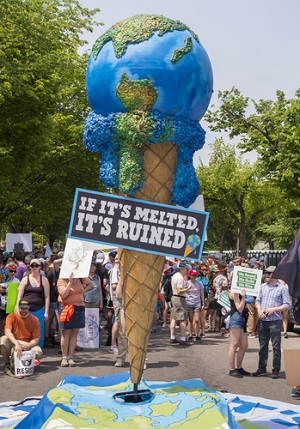US withdrawal from Paris Agreement sparks debate over legal ramifications
Michael D Goldhaber, IBA US Correspondent
In the aftermath of the US leaving the Paris Agreement on climate change, its opponents have been exaggerating its legal effect, and environmentalists playing it down.
Trump’s supporters contend that staying in the Agreement could have weakened the US legal position on climate change, both in terms of international damages suits and domestic regulatory actions.
Seizing on the plain language of Article 4 of the Agreement, they argue that a nation may only adjust its ‘contributions’ to climate control upwards, ‘with a view to enhancing its level of ambition.’
‘Believe me, we have massive legal liability if we stay in,’ Trump said in justifying his decision to take the US out of the Agreement.
Yet even Trump’s supporters acknowledge that the Agreement is voluntary: a ‘contribution’ is not a commitment. It would therefore be absurd to give it a determining effect in any legal forum.
Michael Burger directs the Sabin Center for Climate Change Law at Columbia University. ‘The Paris Agreement doesn't provide a basis for any claim of loss and damage,’ he says, ‘either in an international tribunal or in any domestic court. It expressly doesn't do that.’
In addition, the Paris Agreement would not have affected Trump’s efforts to dismantle the Clean Power Plan, as the two are completely independent of each other.

Protests at climate change march. Rob Crandall, Shutterstock
Some academics would like to broadly regulate US climate pollution as posing a health danger abroad, under Clean Air Act section 115.
That would require other countries to offer ‘reciprocal’ protection, similar to what will be achieved by the rest of the world standing by the Paris Agreement. This might have been one way of the US contributing to the Paris Agreement, while it was still signed up. However, it would not be accurate to claim that US membership of the Agreement could have formed the legal basis for any action taken under section 115.
Burger doesn’t think a court would ‘invoke this never before used provision of the Clean Air Act in order to achieve a voluntary, nonbinding target set forth in an international agreement that has no internal enforcement mechanism of its own.’
Burger argues that dropping out of the Paris Agreement could in fact heighten US legal risk. The leading active climate case in the US is Juliana v US, where a group of children are asking an Oregon federal court to mandate carbon regulation under the Constitution and public trust doctrine.
The children have survived a motion to dismiss, and hope for a trial in the autumn. ‘Where the federal government is absolutely abdicating its responsibility,’ Burger argues, ‘US courts are more likely to create a new environmental right, and to find it violated’.
Burger also thinks the UN General Assembly could ask the International Court of Justice for an advisory opinion on America’s climate obligations. If Trump aims to reduce international legal risk, taking a position at odds with every UN member state save Syria is an odd way to go about it.
Ann Carlson and Sarah Duffy of UCLA School of Law argue that withdrawal from the Paris Agreement might help green politics, because it brings Trump’s position into the open. ‘From a domestic political perspective,’ says Duffy, ‘it could actually be very good for the environmental community. [Trump’s] administration was rolling back all these things quietly, piecemeal, one by one.... Now they've done something really public that makes [the US] an outlier in the entire world, that has [received a lot] of news coverage. In all that news coverage people are starting to learn about the other things [Trump’s] been doing to the Environmental Protection Agency (EPA) and environmental regulation.’
‘‘The Paris Agreement doesn't provide a basis for any claim of loss and damage, either in an international tribunal or in any domestic court.’
Michael Burger
Director, the Sabin Center for Climate Change Law at Columbia University
In addition to halting the Clean Power Plan, Trump has taken steps to roll back fuel economy standards in the transit sector, efficiency standards for appliances, limits on methane emissions, as well as drilling restrictions in public lands and offshore waters.
Despite all this, Duffy finds cause for optimism. It may help that she resides in California, which is the leader in subnational climate regulation and diplomacy. On 1 June, California joined with New York and Washington, along with some 30 cities, 80 universities and 100 businesses, to reaffirm American commitment to the Paris Agreement. This group hopes to grow and participate informally in the Paris process, based on the model of the ‘Under2 Coalition’ of 170 subnational jurisdictions from around the world, which was launched by California in 2015. The week after the US withdrew from the Paris Agreement, California Governor Jerry Brown flew from Sacramento to Chengdu and Nanjing for climate talks.
California operates a model carbon trading system, and nine northeastern US states run an effective cap-and-trade regime for electricity. The most advanced US states have ambitious renewable energy obligations, and tough limits on methane. California boasts the world’s strictest car fuel standards (though Trump’s EPA may try to block them). Thanks to technology, California has approximately ten times as many renewable jobs as the US has coal jobs. Put it all together, and carbon pollution in the state is nearing 1990 levels.
Can the US still meet the goals of the Paris Agreement? ‘I think we can still do it,’ says Duffy. ‘I think it's not at all out of the realm of possibility to do it, between states and cities and the fact that the market for the electricity sector is already moving away from coal.’ Seen through green-and-rose-tinted sunglasses, leaving Paris may not be such a massive tragedy after all.